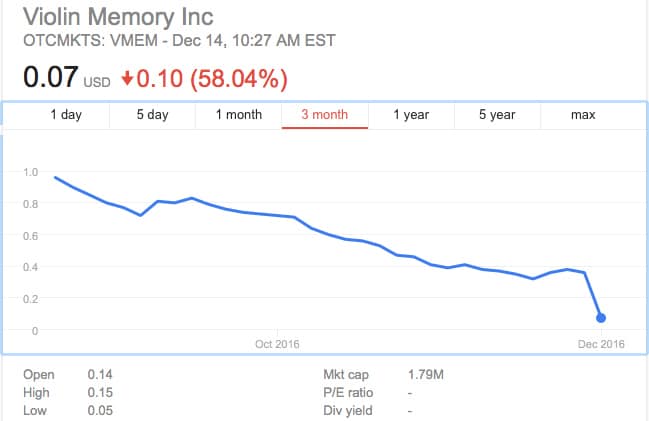
Violin Memory has had a rough go of it recently but it appears as if they are nearing the end of their rope. Violin was a pioneer of early all-flash arrays, which are becoming more and more common in data center, along with all-flash data centers. However, the company was been plagued with issues for some time now and earlier this morning they announced they would be pursuing Chapter 11 operational and financial reorganization. Chapter 11 doesn’t always mean the end of a company; in this case, however, it looks as though Violin Memory is finished.
Image courtesy of Google Finance
Violin has had issues for some time. It’s stock has not been a great performer from the beginning. It only went above its IPO for less than a month before slowly dropping, never to recover. The company quickly found itself battling a class action lawsuit, surrounding its disclosure of sales data regarding government contracts that were cancelled. Last year Violin’s 3Q earnings missed expectations, beginning the gradual decline that brought them to Chapter 11 today. Things got worse as investors groups attempted to steer the company in a different direction. The two groups didn’t come to an agreement and the investor groups attempted to nominate three new board members.
Nothing much improved from there, as the company missed it’s 4Q earnings expectations, it was given notice by NYSE to get its stock above $1/share or face delisting. To address this, Violin reduced its workforce by 25% and made a vague announcement about addressing the delisting issue. The plan turned out to be a 4-to-1 reverse split bringing their stock above $1/share briefly, before being delisted by the NYSE as it once again slipped below the $1/share threshold for 30 days.
During its restructuring process, Violin intends to continue to sell solutions to and support its existing customers. The company is looking to have an auction for its core business in January of 2017. The company still has something to offer for buyers: its customer list, service revenue, over 100 patents (with nearly a 100 pending), along with its remaining hardware and software.
Violin made a great, albeit expensive, product. The WFA-64 Windows Flash Array we tested had great results. However their equipment was proprietary. This is fine when you are the only one in the game. When other vendors start coming out with all-flash arrays that use standard SSDs, there is a problem with proprietary VIMMs that can only be bought from Violin. Not only were other vendors cranking out all-flash arrays, they were able to drastically reduce costs while offering more services making them more attractive while Violin struggled in this regard.
Sign up for the StorageReview newsletter

